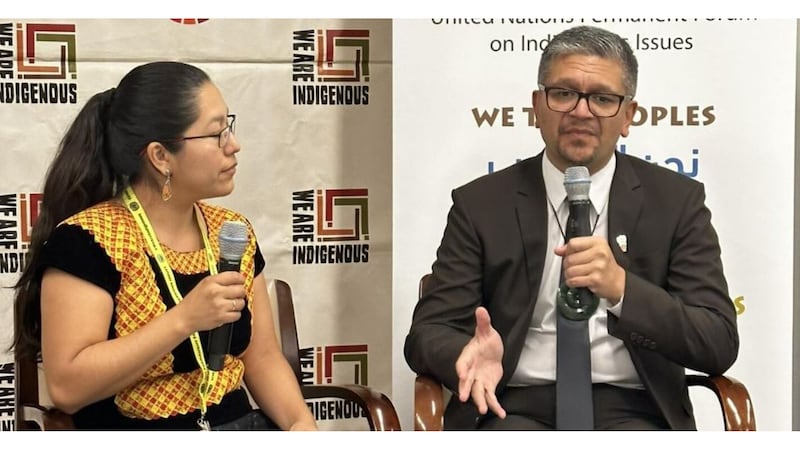NEW YORK — Shane Taurima has returned to the United Nations Permanent Forum on Indigenous Issues (UNPFII) as UNESCO unveils a landmark global study highlighting major challenges facing Indigenous media, including severe underfunding and barriers to access.
Taurima, Kaihautū of Whakaata Māori and Chair of the World Indigenous Broadcasting Network, is attending the forum in both capacities.
He previously participated in the UNPFII two years ago, when the forum acknowledged the critical role of media in protecting and promoting Indigenous rights and called for a global study.
That study, now completed, was officially released this week.

He spoke with journalist Te Aniwaniwa Paterson of Whakaata Māori in New York, who joined a network of Indigenous journalists covering UNPFII.
The coverage is organised by Grist, a non-profit, independent media organisation that focuses on telling stories on climate solutions and a just future, which has been organising the pooled footage for four years now.
Indigenous media underfunded, facing barriers in access and resources
The report reveals that 73 per cent of Indigenous media organisations cite insufficient financial resources as a major obstacle, while 51 per cent face difficulties due to the high cost of equipment.
Alarmingly, 19 per cent of these organisations have no internet access at all.
“[Indigenous media] is essential and it’s impactful, but it’s unfortunately under-resourced, under-funded and often overlooked from a policy perspective and excluded structurally,” Taurima said.
Last year, it was announced Whakaata Māori would lose $9.5 million in funding over the next three years, representing a 20 per cent reduction in budget.
Taurima expressed his support for the report’s recommendations.
These include strengthening legal and institutional frameworks, revising or creating inclusive media laws and policies, and ensuring Indigenous peoples’ rights to freedom of expression and access to media.
Paiheretia te kotahitanga o te ao iwi taketake ki ngā kōtuinga pāpāho
Ko tētahi anō whāinga matua a Whakaata Māori ki te huihuinga nui nei, arā, he whakakaha ake i ngā hononga ki ngā kōtuinga pāpāho iwi taketake.
Ka mutu, e whakaritehia ana e Whakaata Māori, te haina kirimana ōkawa me ētahi ranga kawepūrongo nui o te ao ki raro i te Indigenous News Alliance (INA)
Ko Grist, Mongabay, te Associated Press, IndigiNews, Osage News, me te Indian Country Today ētahi o ngā rōpū kei raro i te maru o te INA.
Ko tāna, he whākaha i te reo me ngā pakiwaitara a ngā iwi taketake puta noa i te ao.
“We’re pleased to stand here in solidarity with other Indigenous media organisations who are also working really hard every day to serve our Indigenous communities by promoting our languages, our cultures, telling our stories and reclaiming our narratives,” Taurima said.
Te tūranga o te ao pāpāho iwi taketake i te tutūnga o te puehu
He mea whakaū nā Taurima te tūranga motuhake o te ao pāpāho iwi taketake, i te ngāueuetanga i te ao tōrangapū ki ngā whenua maha huri noa.
“The role that we play as Indigenous media is very important, especially in times that we are seeing ourselves in today,” he said.
“It’s critical that our Indigenous voices and perspectives are shared globally.”

